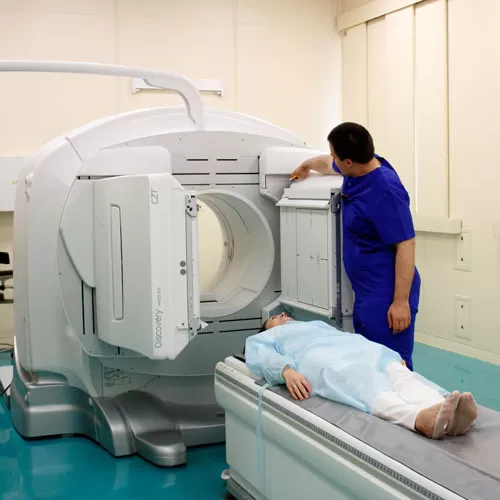
Radionuclide, or radiation diagnostics, is a radiolgical study method based on the use of certain compounds labeled by radionuclides. These compounds include radiopharmaceuticals that are permitted for introduction into human body for diagnostic and therapeutic purposes. Radiopharmaceuticals are chemical compounds that contain certain radionuclides.
Nuclear medicine studies are conceptually different from X-ray and ultrasonic examinations.
Here is some more information about radionuclide studies.
Visualization of organs is effected through scintigraphy. Scintigraphy us the method based on selective accumulation of radiopharmaceuticals in the studied organ and their subsequent clearance. This technique makes it possible to study the topography of an organ and to identify morphologic, functional and metabolic disorders. This enables visualization of tumors, inflammations and thrombosis areas.
Nuclear medicine techniques are an alternative to functional diagnostic methods (electrocardiography and electroencephalography) that use electrical phenomenons to reflect blood flow and metabolism implicitly.
All this makes nuclear medicine methods unique both for early diagnostics of disorders and for ongoing monitoring, besides, one-time radiation exposure of the patient is about 100 times lower than that during a conventional X-ray examination.
Apart from the above, radionuclide diagnostics is intended to tackle such problems as determining the indications for a surgical procedure of hepatic resection on patients affected by primary cancer; timely adjustment of X-ray therapy courses for patients affected by tumor deposits of various localization; optimization of targeted cell therapy during the postoperative period; accurate localization of surgical intervention boundaries in sarcomas of the lower limbs; determining the advisability of waiving an operative mutilation (amputation) of the lower limbs in sarcoma-affected patients following chemotherapy; determining the applicability of a skin flap for transplantation in a surgical procedure of breast recovery after a mastectomy due to mammal gland cancer; and developing an optimal tactics of postoperative therapy and rehabilitation of patients after sarcoma-related surgery (in particular, making decisions on the advisability and time frames of prosthetic rehabilitation of a lower limb.
RADIONUCLIDE DIAGNOSTIC CAPABILITIES OF THE RCMC
The Isotope Laboratory of the Republican Clinical Medical Center performs radionuclide diagnostics using expert-class equipment -- the Discovery NM/CT 670 CZT station. The station offers the possibility to apply the hybrid isotope diagnosis technique which combines single-photon emission computed tomography and X-ray computer tomography.
Today, the RCMC offers the following isotope studies:
- Skeletal system examination
- Liver and bile-excreting duct examination
- Liver and spleen examination
- Kidney examination (ongoing obseravation)
- Kidney examination (cross-sectional study)
- Heart examination
- Lung examination
- Thyroid gland examination
- Parathyroid gland examination
- Brain examination
- Salivary gland examination
Please note:
1. The cost of the contrast medium is not included in the service fees, and is paid separately.
2. The service fees of X-ray computer tomography are paid separately.
Contraindications to any type of radionuclide examination
- Women of reproductive age in cases of established or suspected pregnancy.
- Children under 16 years in cases of preventative examinations;
- Idiosyncrasy to pharmaceutical components;
- Acute psychological disorders;
- Terminal states;
- Weight or biological parameters of the patient exceeding the capacity of the equipment (220 kg, or the diameter of the gantry).
During the period of lactation, the patient must suspend breast-feeding (the duration of the suspension shall be determined by the diagnostician depending on the used contrast medium).
It is recommended to wear clothes without large or metal decorations (buttons, stones, buckles, zip fasteners, etc.); if the patient is unable to maintain a stationary position for a long time (up to 25 minutes) due to a painful condition, they may be administered an anesthetic pharmaceutical (based on a consultation with physician);
Metal prosthetics, cardiac pacemakers, stents and allergy to iodinated contrast substances are not considered to be contraindications to the examination.
Patients undergoing examination on commercial basis shall also present a referral or a consultative medical report signed by the consulting physician. The medical services are paid for after completion.
What to do after the examination
We recommend:
- stay as far as possible from other people (keep a distance of about one meter);
- drink more of (any) liquid -- up to two liters (this does not apply to persons affected by a hypertensive disease or a kidney disorder);
- avoid eating products that may lead to increased retention of liquid in the body (excessive quantities of common salt, heavily salted meals, smoked or pickled products).
- If you need to stay with somebody for a long time (for more than one hour), keep an optimal distance of two meters.
- Refrain from sexual contacts with your partner and sleep separately for the first night after the examination.
- Keep a distance of one to two meters from children under 3 years old, avoid close contacts with them (cuddling them or carrying them in your arms), if direct care of children under one year old is required, it shall be provided by somebody else (optimally, you should spend this time with relatives or friends).
- After visiting the toilet, wash your hands thoroughly with soap.
- Rinse bathroom facilities (basin, shower stall, etc.) twice after use.
- After you have finished using the toilet, flush water twice using a full tank (we recommend men to sit while urinating).
- If you breast-fed a child before the examination, you must suspend this during the examination. Do not use breast milk produced during this time (the child shall be fed artificially). You may resume breast feeding after a day or after the period stated by the diagnostician.
- Since a radioactive medium is excreted with urine, wash your underwear. It shall be washed separately and may be used on the next day. Other clothes do not require any isolation or manipulations.
- If possible, stop or limit contacts with pregnant women (try to keep two meters away from them).
- It is recommended that preschool and school teachers and other persons that are liable to contact children closely schedule a temporary leave from work.
- If you have been delivered to a medical institution on the day of the examination due to an emergency, please inform the medical staff that you were under an examination with the use of radionuclides.
- If you need to cross state borders through checkpoints, inform the laboratory physician accordingly -- airports and border crossings are equipped with dosimetry systems that register radiation.
- Since you are a source of ionizing radiation until the complete decay and excretion of the administered radio pharmaceutical, please keep the document evidencing your examination with you to be able to present it when crossing a border.
You may also find information on the examination an relevant limitations in the Internet, the medical section of a library or a book store. Since not all the information that you may find may be fully accurate, please remember that your consulting physician is the most reliable source of information.
If you should have any additional questions, please address them to laboratory stuff.
You may make a reservation for a planned consultation by calling (017)543-42-23, (017)543-42-19. Oleg Arkadievich Baranovsky -- Head of the Isotope Laboratory.




